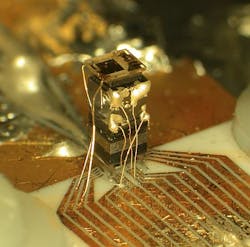NIST scientists win 2014 Rank Prizes for chip-scale atomic clock
Boulder, CO--Physicists John Kitching and Svenja Knappe of the National Institute of Standards and Technology (NIST) will receive 2014 Rank Prizes in optoelectronics "for the creation and demonstration of the first chip-scale atomic clock."
Related: Optical clocks set the pace in accurate timekeeping
Sharing the prize will be Leo Hollberg, who hired Kitching and Knappe at NIST and led their research group in 2004 when the chip-scale atomic clock was invented. Hollberg left NIST in 2008 and is now a member of the physics faculty at Stanford University (Palo Alto, CA).
The Rank Prizes are presented every two years by the charitable Rank Foundation (London, England). The prizes are awarded to individuals who have made a significant contribution to certain scientific fields, including optoelectronics, "where an initial idea has been carried through to practical applications that have, or will, demonstrably benefit mankind." Lord Rank established the foundation to benefit fields related to his career, including, in the case of optoelectronics, the film industry.
NIST's chip-scale atomic clock made highly accurate timekeeping portable. This is useful, for example, when navigating locations where a global positioning system (GPS) doesn't work, such as in underwater resource exploration. Clocks of a similar basic design were commercialized several years ago. NIST's early experimental chip-scale atomic clock recently went on display in the Smithsonian Institution's Time and Navigation exhibit.
Kitching, Knappe, and Hollberg also developed a spinoff technology, chip-scale atomic magnetometers, first introduced in 2005. Kitching and Knappe are now studying the possible use of these devices in medical applications, such as measuring human brain activity.
The Rank Prizes will be awarded at a ceremony in London in February 2014. The prize includes approximately $23,000 (£15,000) each for Kitching and Knappe.
For more information, please visit www.rankprize.org.
-----
Subscribe now to Laser Focus World magazine; it's free!
